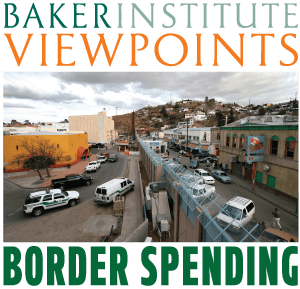In an effort to secure bipartisan support for immigration reform, a bill recently passed by the Senate includes a dramatic increase in border security spending of at least $40 billion. This funding provides for the addition of 18,000 new Border Patrol agents, 700 miles of fencing and expanded use of drones on the U.S.-Mexico border. Facing financial losses from the withdrawal of U.S. forces from Iraq and Afghanistan, the nation’s largest private military contractors are now vying for profitable contracts on the U.S.-Mexico border. Critics have argued that increasing border security spending will further militarize the border and exacerbate existing budget deficits. In this Baker Institute Viewpoints series, six experts respond to the question: What are the implications of expanding border security? Their analyses cover a range of issues — including the legality of drones, the environmental impact of constructing border fencing and the politics of bipartisan compromise — and reveal the complex unintended consequences of increasing spending on border security.
Read other posts in this series:
- Border security and (mis-)management by Tony Payan, fellow in Mexico studies and director of the Mexico Center
- U.S. border security spending: Too much, too late? by Robert Bunker, senior fellow with Small Wars Journal — El Centro
- Achieving border security: A matter of money or competency? by Guadalupe Correa-Cabrera, assistant professor and chair of the government department of the University of Texas at Brownsville
- Securing the “hyperborder”: U.S.-Mexico border security investments by John Sullivan, lieutenant in the Los Angeles County Sheriff’s Department and senior fellow with Small Wars Journal — El Centro
- Less fence, more task force by Nathan Jones, postdoctoral fellow in drug policy
Increasing border security seems an inevitable part of any compromise immigration reform legislation. According to media reports, these measures will likely involve funding for surveillance capabilities on the U.S.-Mexico border previously used primarily for military operations, including drone technology.
Civil libertarians are already expressing alarm about increasing domestic surveillance capabilities at the border. This concern gestures toward a broader fear that contemporary threats to national security, particularly terror threats, have distorted the historical legal grounds that protect U.S. citizens from government surveillance and data collection. In actuality, if there is one area where the law provides well-recognized and expansive justification for domestic surveillance, it is at the border.
The Supreme Court has long recognized that the protection of borders is a fundamental principle of national sovereignty. As a result, surveillance measures that would almost certainly violate the Fourth Amendment’s proscription against unreasonable searches and seizures are considered legally permissible when used to protect international borders (which, although not widely understood, includes any international port of entry, such as an international airport). The “border search” doctrine in U.S. criminal law allows government officials to randomly stop and search individuals, containers and vehicles at the border without any requirement of probable cause or suspicion. These searches and seizures are considered reasonable precisely because they are intended to protect national interests at the border and guard against unauthorized entry. Only searches that are especially intrusive — such as a body cavity search or a search that results in the permanent destruction of property — require some level of suspicion or cause. Even in these cases, the requirement is that of reasonable suspicion, a much lower standard than the probable cause requirement for obtaining a search warrant.
Therefore, leveraging emerging surveillance technology to monitor the border is not only operationally logical, but also legally sound. The fact that the technology in question was originally developed for the military does not alter this conclusion. In fact, the U.S. government has been using military assets to secure the border for quite some time. During the 1980s, Congress enacted numerous statutes authorizing military support for law enforcement efforts to stop the flow of illegal narcotics. Many of these militarized efforts focused on monitoring border crossings and providing intelligence to federal law enforcement agencies. The military even established Joint Task Force headquarters devoted exclusively to supporting counter-drug missions, which conducted numerous operations at the border.
However, there are some legitimate concerns about the increased reliance on military assets to support border security. First, it is a simple reality that once these efforts at the border are validated as effective, the rest of the law enforcement community will clamor for military support for their own efforts. There are already concerns about the militarization of domestic law enforcement as a growing trend. Furthermore, the use of drone technology at the border could be a further step toward the more widespread use of drones domestically. Although such use would still be subject to normal Fourth Amendment controls, many still view domestic drone surveillance as a major intrusion against civil liberty.
Second, reliance on military capabilities for border security contradicts the historically critical sense of aversion to the military taking a role in domestic affairs. The Founding Fathers were acutely aware of the risks of such a role, and the Constitution provides significant checks against “turning the military inward” (such as the Third Amendment’s prohibition against quartering of soldiers in private homes, and the two-year limitation on funding for the Army). This aversion is also evident in the Posse Comitatus Act of 1878, which made it a federal crime to use the armed forces to enforce federal law without express authorization by an act of Congress or the Constitution. As national responses to border and internal threats increasingly rely on military capabilities, it becomes easier to blur the historical bright-line prohibition of military involvement in domestic affairs. This could threaten not only civil liberties but also the priorities of the military itself, since the Posse Comitatus Act ensures that the military is not distracted by non-warfighting domestic missions.
Despite these concerns, it is almost inevitable that border security efforts will adopt military capabilities and technologies. If properly managed and regulated, military support at the border will produce a net positive effect for border security. However, it is essential that the public understand the special nature of border protection authority in order to derive the right conclusions.
 Geoffrey S. Corn is a professor at the South Texas College of Law, where he specializes in criminal, military, national security and public international law. A retired U.S. Army lieutenant colonel, Corn has been named the law school’s professor and advisor of the year each year since 2008. His work has been published in journals ranging from the Stanford Law and Political Review to the Journal of International and Humanitarian Legal Studies. He is the editor and lead author of a forthcoming book from Oxford University Press on “The Law of Military Operations.”
Geoffrey S. Corn is a professor at the South Texas College of Law, where he specializes in criminal, military, national security and public international law. A retired U.S. Army lieutenant colonel, Corn has been named the law school’s professor and advisor of the year each year since 2008. His work has been published in journals ranging from the Stanford Law and Political Review to the Journal of International and Humanitarian Legal Studies. He is the editor and lead author of a forthcoming book from Oxford University Press on “The Law of Military Operations.”
